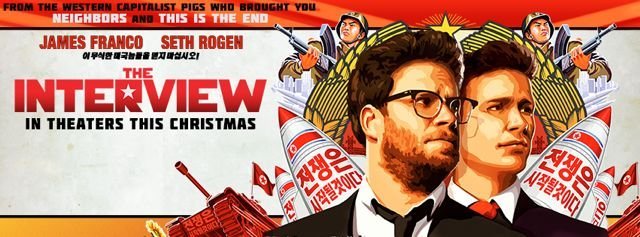![The_Interview_2014_poster[1]](/assets/img/2014/12/The_Interview_2014_poster1.jpg)

12/28/2014
I have no idea who hacked into Sony Pictures, but The Interview might be pretty funny if you’ve never seen a Seth Rogen buddy comedy before, or a Seth Rogen-like buddy comedy from the Apatow mafia, such as Jonah Hill’s amusing 21/22 Jump Street franchise. If you’ve seen a bunch, however, this one won’t be terribly fresh.
In contrast to last summer’s misfire Neighbors in which Rogen tried to play a wild man in the tradition of John Belushi and Chris Farley, in The Interview he’s back to his strong suit of playing the weak but reasonable character, as in 2013?s funny This Is the End.
Rogen is the producer for a trashy cable TV interview show hosted by his idiot best friend James Franco. To earn more respect from their colleagues in TV infotainment, they decide to land a big interview with the dictator of North Korea, Kim Sum Ting. A beautiful CIA lady agent persuades Franco to agree to assassinate Kim with a ricin-poisoned handshake to win her heart, even though much of the limited number of laughs in the movie come from Rogen raising his eyebrows with concern whenever Franco says something that suggests he’s really a homosexual.
The premise of the movie is that Kim is a “master media manipulator.” But obviously that’s not true outside of North Korea, so the movie lacks satirical interest.
It’s an interesting career strategy question how fast comic actors/writers should pump out content after they’ve finally broken through to popularity. For example, This Is the End in the summer of 2013 was fine, but Neighbors and The Interview seem half-baked. On the other hand, Neighbors made $150 million at the domestic box office despite costing only $18 million to shoot.
It’s a very good thing after years of living in a dumpy North Hollywood apartment to wake up and find out that America suddenly finds you hilarious. But the clock immediately begins ticking on this golden age in your career. Americans found Jerry Lewis very, very funny for a certain number of years and then were puzzled by why the French kept finding him funny. Jim Carrey may have had the strongest, most agile facial muscles ever, but eventually people lose interest in going to Jim Carrey movies.
Is the window of the public finding you funny measured in absolute time (X number of years) or in relative time (Y number of feature films)? After sound came along in the late 1920s, Charlie Chaplin responded by working immensely long on each film. This worked great in City Lights (1931), but less well in Modern Times (1936), with something of a comeback in The Great Dictator (1940).
An oddity in this case is that the proteges recruited by Judd Apatow in the 1990s to be his alter egos are both collaborating with each other (in a kind of comedy cartel) and competing with each other in satisfying the public’s appetite for a certain kind of comedy movie. For example, the first time I saw Rogen and Hill onscreen together, I asked my wife, “So these guys are playing brothers, right?”
So, while it might behoove Rogen to slow down and work harder on each of his movies, it is also reasonable for him to be concerned that his frequent colleagues are also extruding product on their own with or without him, so maybe he should get while the getting is still good.
This is a content archive of VDARE.com, which Letitia James forced off of the Internet using lawfare.